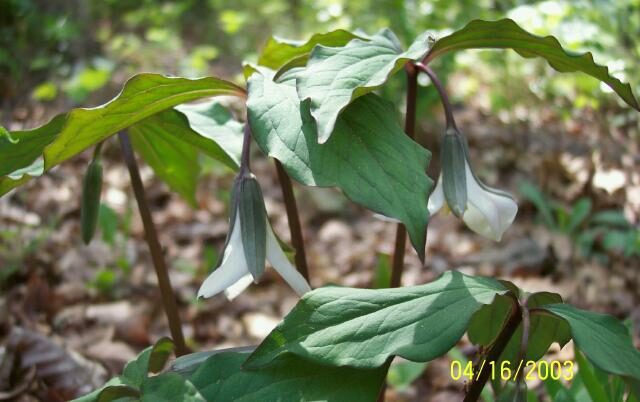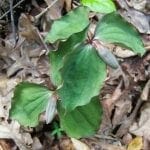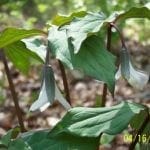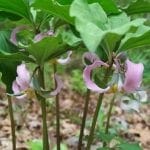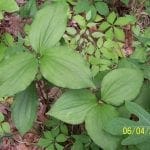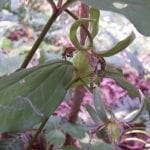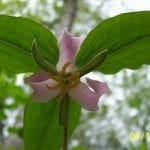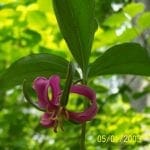- Flower buds
- Flower, just opening, white stage
- Habit, flower hangs down
- Foliage
- Seed forming
- Flower
- Flower, in pink stage
Scientific Name:
Trillium catesbaei
Common Name:
Catesby Trillium
Scientific Name Pronounciation:
TRIL-ee-um KAYTS-bee-eye
Plant Type:
Perennial
Plant Hardiness Zones:
4-9
Plant Hardiness Zone(s):
Usual Size:
8-18 in. H X 6-12 in. W
Flower:
3 white or pink petals, drooping below leaves, each curved backward, on stalk .5-1.5 inches long, with prominent yellow anthers on the 6 stamens surrounding a whitish ovary; 3 green or purplish sepals.
Bloom Time Notes:
Spring
Leaf:
3 well-spaced but whorled elliptic to oval, pointed leaves; green with prominent veins; leaf base narrow, stalk-like, attached to top of narrow green to purplish stems.
Fruit:
Greenish white, oval, pulpy, berry-like pod, about 1/2 inch in diameter.
Wildlife:
Ants carry the seeds to new places.
Natural Habitat:
Often in upland, well-drained, oak-hickory woods; also in mature, rich coves, near streams, and under ericaceous plants such as Mountain Laurel.
Propagation:
Rhizome division or wounding (as described in books by Jacobs and Case); slow from seed; squeeze out green/light brown seeds as pods soften in late June and remove white appendage (elaiosome), or soak 15 minutes in commercial 3% hydrogen peroxide, then plant moist seeds within a week; usually germinates second spring with one leaf after summer sowing; flowers in 5 -7 years.
Bloom Time:
Sun or Shade:
Companion Plants:
Cultural Notes:
Catesby Trillium (Trillium catesbaei) grows in average to humusy but well-drained soil in light to deep shade; flowers point down or sideways and appear more prominent planted in groups of three or more or on slopes above a path; established plants prefer a summer dry period.
Transplant tips: Relatively easy to transplant; dig about six inches deep to lift rhizomes with roots attached; keep moist until replanted; will survive a week or more even when taken without attached earth, but may lose vigor; if stem breaks, will likely resprout the following year, but not flower for several years.
One of 20 different species of Trillium that are native to Georgia.
Other Common Names: Rose Trillium, Nodding Rose Trillium, Bashful Wake-Robin

